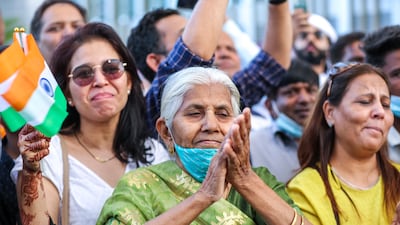The number of Indians living in the UAE has crossed 3.5 million, with more than 130,000 making the move since the end of last year, new figures show.
India's Minister of State for External Affairs, V Muraleedharan, announced the latest migration numbers at a session of the Lok Sabha, the lower house of the country's parliament, on Saturday.
He revealed 3.554 million Indians currently reside in the Emirates, up from 3.419 million at the end of 2022.
He said the UAE remained the most popular destination for Indian citizens seeking work overseas.
The Gulf region continues to attract an influx of Indian talent, with a total of 7.93 million living in the UAE, Saudi Arabia, Kuwait, Qatar and Oman alone.
The Indian government has established Overseas Indian Help Centres in Dubai, Riyadh, Jeddah and Kuala Lumpur to help meet the needs of an increasingly mobile workforce, he said in remarks carried by state news agency Wam on Sunday.
As India prepares to mark its 77th Independence Day on Tuesday, concerns persist over whether the exodus of professionals to other countries amounts to a 'brain drain' that could slow the 1.4 billion-strong nation's development.
Mobile labour market
Mr Muraleedharan, on a visit to Dubai in January, hailed globe-trotting Indians for making the world their workplace.
“You can work anywhere you like but have India in your heart,” he said in an address to more than 1,000 pupils at the Indian High School in Dubai.
“Earlier, Indians who received education in India but went abroad for work were termed "brain drain". We no longer use that word for the phenomenon now," Mr Muraleedharan said.
“We say Indian youth have transformed the whole world into their workplace.
“So, you may have received your education in India or you are studying in Dubai, always uphold the tradition of vasudeva kutumbakam (the world is one family).”
Long-standing friendship
The UAE and India have sought to deepen their strategic partnership over recent years, bolstering trade as well as cementing ties in culture, the labour sector and education.
In February 2022, the allies signed a Comprehensive Economic Partnership Agreement that is expected to boost non-oil trade between the two countries to $100 billion in five years, from $60bn currently.
The agreement marked a new phase of co-operation and aims to open additional avenues of investment and trade for companies in India and the UAE.
It would add 1.7 per cent or $8.9bn to the UAE's gross domestic product and boost exports by 1.5 per cent or $7.6bn by 2030, said Abdulla bin Touq, UAE Minister of Economy, in an online joint press conference in New Delhi at the time, which was attended by top government officials from both countries.
The 881-page agreement lifted 80 per cent of tariffs on UAE and India goods, while all tariffs will be removed within 10 years, said Dr Thani Al Zeyoudi, the UAE Minister of State for Foreign Trade.
Indian Prime Minister Narendra Modi’s visited to the UAE in July, in a further demonstration of the close links binding the countries.
It was the fifth visit of Mr Modi to the UAE after he assumed office in 2014.
India’s prestigious Indian Institute of Technology, better known as IIT, will begin courses in Abu Dhabi next year, the country's envoy to the UAE confirmed in February.
Sunjay Sudhir, Indian ambassador to the UAE, outlined details about the IIT’s first campus outside India.
There are 23 IITs in India and the institute is famous for producing graduates ranked among the world’s most successful innovators, engineers and entrepreneurs.
Meanwhile, Abu Dhabi's long-awaited Hindu temple will open in Abu Dhabi in February after four years of meticulous work on the striking place of worship by artisans in India and the UAE.
Spread over 5.4 hectares, the land was given to the Indian community in 2015 by President Sheikh Mohamed, who then served as Crown Prince of Abu Dhabi.












